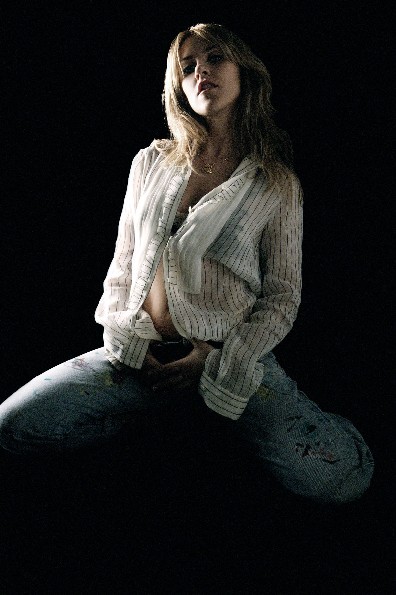Copyright ©2005
PopEntertainment.com. All rights reserved.
Posted:
November
7, 2005.
Okay, indie snobs, lay off of Liz Phair already, would ya?
Yes, I know she was your poster girl back in 1993 when she
released the rightfully celebrated alt-rock album Exile in
Guyville, a lo-fi celebration of classic riffs
and low life. Here was a cute alt chick that was sensitive enough to
write an extraordinarily insightful dissection
of her life like “Canary” and wild enough to do a
down-and-dirty grinder (in more ways than
one) like “Fuck and Run.”
But that was twelve years ago. The sexy-but-neurotic
twentysomething visual arts-major-turned-rock chick is now in her
thirties, a divorcée and single parent.
She may still be sexy and neurotic,
but she has to make a living. And guess what, guys? She likes pop
music. Nothing wrong with it.
That should be no real surprise to anyone who has ever
given more than a cursory listen to her three acclaimed albums of the 90s
– Guyville, Whip-Smart and whitechocolatespaceegg. While
these albums were all raw and throbbing examples of her
spiky-yet-introspective lyrics and had something of a bare-bones
production style, a great sense of tune and melody shines through. The
signs were all there.
So it’s kind of shocking the fury that the
underground-fringe critics tossed her way when she released the 2003 album
Liz Phair. They seemed offended that she would actually work with
other writers, including… shudder… the production team The Matrix, who
helped to define Avril Lavigne’s sound. Of course, they didn’t mention
the fact that she also worked with similarly smart, quirky alt-pop artists
like Wendy Melvoin, Pete Yorn and Michael Penn. Then Phair had the complete nerve to
actually have a top 40 hit single with “Why Can’t I?” and allowed the
spectacular pop-rock nugget “Extraordinary” to be used as the theme song
to a bad Kate Hudson movie (Raising Helen). You’d think that she’d
torched the critics’ whole stash of flannels and Doc Maartens by the way they reacted.
What the
detractors could not acknowledge was the fact that while the album was
certainly more polished and blatantly commercial, it still was made up of
the kind of smart songwriting and lyrics that has been Phair's
stock-in-trade since day one. It also had some of her most
impressive melodies.
Phair
wasn’t surprised by the reaction; however she was shocked by the vitriol
of some of the people.
 “I
expected there to be a backlash,” Phair acknowledges. “I just didn’t
realize how large it would be. I really became sort of a piñata for
people. They began to take shots at me all the time. I think, because it
was easy. It wasn’t like those same people were really that interested
when I did whitechocolatespaceegg. They weren’t really paying
attention to my career at that point. I think it gathered a whole bunch
of critics ready to take a shot, who hadn’t really been following my
career for a number of years. Simply because it was sort of exciting, the
difference between this indie-cred artist from Guyville and this
pop incarnation of the same person. They didn’t follow me through the
steps, the progression that led to that. They just kind of jumped on and
began to compare and contrast the two extremes. Which is a fun game, you
know, but not really the whole picture.”
“I
expected there to be a backlash,” Phair acknowledges. “I just didn’t
realize how large it would be. I really became sort of a piñata for
people. They began to take shots at me all the time. I think, because it
was easy. It wasn’t like those same people were really that interested
when I did whitechocolatespaceegg. They weren’t really paying
attention to my career at that point. I think it gathered a whole bunch
of critics ready to take a shot, who hadn’t really been following my
career for a number of years. Simply because it was sort of exciting, the
difference between this indie-cred artist from Guyville and this
pop incarnation of the same person. They didn’t follow me through the
steps, the progression that led to that. They just kind of jumped on and
began to compare and contrast the two extremes. Which is a fun game, you
know, but not really the whole picture.”
In fact, Phair
acknowledges that the original reaction to the album that inspired the
indie girl rep was not quite
the way that history has painted it. “It wasn’t as accepted as you
think,” she says. “It was actually very controversial. There was quite a
bit of argument back and forth... I was getting a lot of accolades, but
there was quite a bit of bitter press about that, as well, at the time.”
Despite being
considered a classic of the genre, the album never sold all that
incredibly well either. The 1994 follow-up garnered more respectful
acclaim at the time, even less sales. By the time that
whitechocolatespaceegg
appeared four years later, the world was in the middle of the Lilith
movement; where smart female
singer-songwriters were revered and Phair’s album
should have been a smash. It wasn’t though; few
people other than Phair's staunchest fans have ever
heard it.
In the meantime, Phair
was busy living a life, making love, making mistakes, getting married,
getting divorced, having a child, moving to a new city, finding
her way. She does not find it odd that it took about four years between
her second and third album, and another five before her self-titled
breakthrough album. You see, there is more to Phair than just her music.
“I’m not really
naturally a performer,” she admits. “I mean, I’m mostly a writer. I was
always ambivalent about the music profession, because I intended to be a
visual artist. I’m more temperamentally designed for that. At various
times of my life, I just kind of check out of the whole music biz thing
and live my life.”
So it was rather a
pleasant surprise to Phair that when her new album came out she actually
became a radio star, with “Why Can’t I?” and to a lesser extent
“Extraordinary” ruling the airwaves for several months. Finally, after a
decade of trying, Phair had broken through to a wider audience.
“It was really fun,”
Phair says. “It was a lot of fun to try to climb that mountain. It took
a lot of hard work. I definitely feel like I earned every step on those
charts. It was very illuminating, in terms of what
 radio
is all about. I’m interested in business and stuff like that. I’m interested in just
how different businesses run and what goes into them. It was kind of neat
to just check out that was all about.”
radio
is all about. I’m interested in business and stuff like that. I’m interested in just
how different businesses run and what goes into them. It was kind of neat
to just check out that was all about.”
Now, two years later,
Phair is back with her fifth album
Somebody’s Miracle.
Like Liz Phair,
the album has definite pop sensibilities. However, it is a more adult
sounding album. Phair’s life is in a much more stable place than it was
when she recorded the last album, and that stability shines through.
“It really has to do
with what’s going on in my life at the time,” she acknowledges. “The last
record, there was a lot of talk about sex and relationships and a lot of
firsts. Trying on things in a lighter sense, because I was newly divorced
and living in a new city. Those were the kind of experiences I was
having. With this record, I’ve been in a relationship for a couple of
years. I’ve adjusted to life in Los Angeles, life as a divorced person.
I’m just more settled, so I think I’m looking deeper.”
However,
just because she is happier in her life does not mean that she has
forgotten the bad times. In fact, the first single “Everything to Me”
came quite close to never being on the album because it was such a serious
look at relationships.
“It was sort of a
throwaway song,” Phair says. “It was a song that [co-writer] John Shanks
and I had put down one day but really not thought much of, because it had
kind of a dark subject matter. The verses were a little ironic and almost
black humor in a little way. We just didn’t think it would be something
the label would respond to. We kind of chucked aside and finished these
other two we’d been working on. We turned those in and I never thought
about it again. He picked it up later and began tinkering with it and
turned it in at a later date to the label, without telling me. I was
getting all these calls – from the label and my manager – and they were
like, ‘we love the song.’ I had no idea what they were talking about.
What song? There is no song. What are you talking about? I’d completely
forgotten about it. They’re like, ‘well, we’ll send you a copy.’
“When I heard it, he’d
really worked on it and turned it into something. This made me really
happy, because it was one of those songs that at its essence almost seemed
too real or too personal or dark to be a single. The fact is I always
liked that [type of song] best. It’s easy to write a light, poppy song
that sounds single-y, but when you take something that has a real
relationship underpinning to it, that maybe isn’t all bright and cheery,
and then you add the production that makes it seem [like a] single… that’s
a very powerful combination.”
Another powerful track
is the melancholy “Table for One,” a harrowing look at alcohol addiction
that Phair said was a way of exorcising the party girl image that has
followed her throughout her career. (“Very much so,” she says.) However,
as hard as it was to write, she feels it important to have a song or two
where she strips her soul naked.
“I always make sure
there is at least one song on every record that has that. It’s really
hard for me… Really I kind of consider that my envelope-pushing. I like
a record to have at least one song that’s kind of light and fluffy, and at
least one song that I can barely sing. You know, for me I think
Guyville
had ‘Never Said’ on
the one hand, which really doesn’t say too much,” Phair laughs. “Then
things like, you know…
 uhh…
now I’m forgetting it. The piano song.” She starts singing quietly, “‘I
learned my name, I write with a number two pencil. I work up to my
potential.’ [The song is ‘Canary,’ also from
Exile in Guyville.]
That one almost makes me cry when I listen to it. “Little Digger” on the
last record would be the hardest song for me. On
whitechocolatespaceegg,
'You
Go on Ahead' would be the naked confessional
one. ‘Table for One’ really was an important part of Somebody’s
Miracle.
Because Somebody’s Miracle
really has a lot
of coming to terms with my life and how I’ve led it. What I’ve learned
from it. So, ‘Table for One’ was definitely about dignifying the
lowest point.” She laughs again. “Because we all have them.”
uhh…
now I’m forgetting it. The piano song.” She starts singing quietly, “‘I
learned my name, I write with a number two pencil. I work up to my
potential.’ [The song is ‘Canary,’ also from
Exile in Guyville.]
That one almost makes me cry when I listen to it. “Little Digger” on the
last record would be the hardest song for me. On
whitechocolatespaceegg,
'You
Go on Ahead' would be the naked confessional
one. ‘Table for One’ really was an important part of Somebody’s
Miracle.
Because Somebody’s Miracle
really has a lot
of coming to terms with my life and how I’ve led it. What I’ve learned
from it. So, ‘Table for One’ was definitely about dignifying the
lowest point.” She laughs again. “Because we all have them.”
However, the album is not all a dark ride –
it also has gorgeous love songs like the
gloomy-but-hopeful “Leap of Innocence,” tuneful
masterpieces like “Stars and Planets” and “Lazy Dreamer,” bluesy-strutters
like “Got My Own Thing” and a wonderful unrequited-love ballad with the
title track. She also can put together some stupidly happy-in-love songs
like “Count on My Love.” Despite her history of caustic romantic
cautionary tunes, Phair acknowledges she can do an upbeat love song too.
“If
you’re going to analyze something, one tends to pick it apart before one
just accepts it wholeheartedly,” Phair says. “But I have later, and on
Somebody’s
Miracle,
tried
to talk about the happy times. Sort of depict in songs the parts of the
relationships that you do feel optimistic and hopeful about. Because
certainly they exist. It’s just [in the past] when I feeling that way I
would never run into a room and pick up a guitar. If I were happy, I
would be enjoying that. I never would write songs when I was particularly
really happy. Like I said, I was born to be a visual artist, so when I’m
happy I’m pretty much out there. Guitar was kind of a therapy for me.
So, I think it skewed negative because I would use my songs as a way to
say what I couldn’t say. I think I also had a lot of defensiveness in
me.”
Somebody’s Miracle
is also remarkably restrained and clean for an album from the woman who
wrote “Fuck and Run” on Guyville
and “H.W.C.
(Hot White Come)” on Liz Phair.
In fact, “Can’t Get Out of What I’m Into,” the one song she
recorded for the album that could even be at all considered racy was left
off of the album for fear of getting a parental warning sticker. The
Stonesy rocker instead was offered as a bonus track if you purchase the
album on iTunes.
“I didn’t think it had enough expletives in
it to warrant that. But apparently it did. It seemed a little overly
harsh. Nonetheless, I buy all my stuff on iTunes anyway,” Phair laughs,
“so to me it sort of is on the record.”
Another
little bonus that Phair has recorded is a cover of the classic Rolling
Stones prescription-addiction-in-suburbia hit “Mother’s Little Helper” for
the soundtrack to the popular series
Desperate Housewives.
As a longtime Glimmer Twins fan (Exile
in Guyville
was fashioned after the Stones’
Exile On Main Street)
Phair jumped at the chance to do the song.
“They
just asked,” Phair says. “I was extremely excited. Because you know I
love the Stones and that’s an excellent song. It was really fun. It was
kind of one of those things that just falls in your lap. And
Desperate Housewives
is so popular now. We were like, ‘how did we get this?’
‘I don’t know.’ ‘Great, let’s do it.’” She laughs. “Not much in my
career is like that.”
And it
is a career.
Sorry, indie critics. She is working at her trade and offering
something of value to her fans. It even gets to her sometimes,
because after her breakthrough album, the expectations for
Somebody’s Miracle
are even higher than she has ever faced before. Now that she has had some
hit singles, will she be able to return to the charts?
 “I
think I do feel that pressure.” Phair acknowledges. “Because once you’ve
achieved something, then you’re supposed to at least do that again, you
know? It’s really hard, because it seems like the music business is just
falling apart under our feet as we speak. It’s even harder this time
around, like having the ladder disintegrate underneath you when you’re
climbing. So, I try not to think about that too much. I do as much as I
can for the label without going nuts. But then I say, you know what, I
can’t do this much. Or I need this day off. Or something. Because, in
the end, I just found – especially with the rise of ‘Why Can’t I?’ – it’s
great and it’s really fun and it pays off to have a top forty single, but
you’ve got to live your life happily. There’s only so much you can do
to try to control whether anything [catches on]… you know what I mean? I
try to focus more on the stuff that gives me joy, like playing live or podcasting or writing songs or writing stuff.”
“I
think I do feel that pressure.” Phair acknowledges. “Because once you’ve
achieved something, then you’re supposed to at least do that again, you
know? It’s really hard, because it seems like the music business is just
falling apart under our feet as we speak. It’s even harder this time
around, like having the ladder disintegrate underneath you when you’re
climbing. So, I try not to think about that too much. I do as much as I
can for the label without going nuts. But then I say, you know what, I
can’t do this much. Or I need this day off. Or something. Because, in
the end, I just found – especially with the rise of ‘Why Can’t I?’ – it’s
great and it’s really fun and it pays off to have a top forty single, but
you’ve got to live your life happily. There’s only so much you can do
to try to control whether anything [catches on]… you know what I mean? I
try to focus more on the stuff that gives me joy, like playing live or podcasting or writing songs or writing stuff.”
With CD sales slipping, record companies all merging into
each other and radio playlists limited to maybe thirty songs at a time,
Phair sees the time for some radical changes. “The music business is
hurting and I wish we’d all just flip over into the new adaptation and
quit bitching about it, because it’s never fun to watch something dying.
You know what I mean? Let’s embrace the new and flip over to digital.
Put out music when we make it. And quit whining.”
Phair does understand why so many of the alt-rock critics
and fans can’t open their hearts to the pop music that she loves.
However, she cannot bring herself to buy into their reasoning.
“[They don’t like it] because it eclipsed indie,” Phair explains. “It
eclipsed the drive for self-expression. It took too much of the monetary
pie. It took over and all these other bands sort of thought with indies,
‘Hey, here’s our day?’ Music’s going to change forever. It was kind of
like the bust in the technology boom. You’ve got a lot of bitter people
that really believed that life was going to change forever. And it kind
of got repealed. So, for me to go pop would have seemed like, you know,
‘how can you desert our camp?’ For me it’s really, it’s not about camp,
it’s about exploring. Trying new things. Just going along in my life.
“I
really don’t mean to do anybody any harm by making pop music,” she
continues. “I’m not getting frighteningly wealthy off of it, either.
I’m really exactly the same kind of songwriter. I’ve gotten older.
But co-writing with people doesn’t ruin me or change the way I write my
songs. I’m just an artist working in the business today. I think the hardest thing for me is the way people
get paranoid… it’s really paranoia.” She mimics,
“‘Oh, I see, you’re making a bid for world domination and you’re
going against all your principles.’
It’s so much less exciting than that. I’m exactly the same. If
you look at the video for ‘Never Said’ and you look at the video for
‘Everything to Me,’ you’re going to see the same exact girl, just grown
up. The exact same attitude. The exact same posturing. It’s the same
person. It might as well be the same song, really. It’s funny.
I think the biggest
misconception I’d like to clear up is that I’m wholly different than I
was. Certainly, there are differences, as anyone would have over the
course of twelve years. [But] if you knew me, same damn thing.”
business today. I think the hardest thing for me is the way people
get paranoid… it’s really paranoia.” She mimics,
“‘Oh, I see, you’re making a bid for world domination and you’re
going against all your principles.’
It’s so much less exciting than that. I’m exactly the same. If
you look at the video for ‘Never Said’ and you look at the video for
‘Everything to Me,’ you’re going to see the same exact girl, just grown
up. The exact same attitude. The exact same posturing. It’s the same
person. It might as well be the same song, really. It’s funny.
I think the biggest
misconception I’d like to clear up is that I’m wholly different than I
was. Certainly, there are differences, as anyone would have over the
course of twelve years. [But] if you knew me, same damn thing.”
However, Phair doesn’t want her musical career to be
written off as alt-rock or pop or folk or any of the labels like that.
She’s not going for world domination. She knows quite distinctly how she
would like for people to survey the topography of her body of work.
“I would like them to see it historically as a woman’s life
laid out for you to scrutinize,” Phair says. “A woman’s life in the late
20th, early 21st century. Because my whole motivation was, in the
beginning, I was at Oberlin [an Ohio college] studying with an
art history - studio art double major. I was so struck by [the fact that]
in all the tomes and all the canonical books, there were so few female
artists represented. And you knew nothing about their lives. It was
almost like history was just a big blank spot when it comes to how women
lived and what they thought about and what they cared about. I mean there
are a few things, but not nearly as many as there are about men. I just
wanted to log on in history. I used music to do it. Love it or hate it,
here is my life. Here are my ups and downs. Here is what I went through
and here is how I changed. And at least that’ll be there. That was my
whole motivation.”